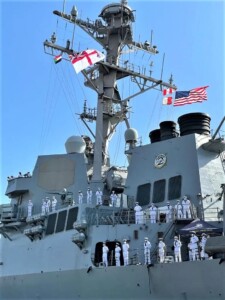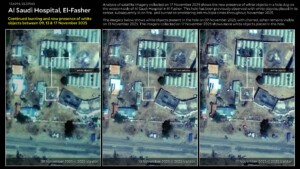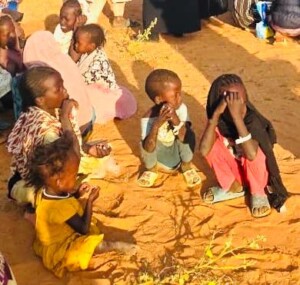Musa Hilal: ‘Darfur Border Guards will not integrate with RSF’
Musa Hilal, head of the Revolutionary Awakening Council, and chief of the Mahameed clan, has strongly defended the Darfuri Border Guards militia and renewed his refusal to integrate it to the Rapid Support Forces (RSF) led by Lieutenant General Mohamed Hamdan (Hemeti).
Musa Hilal, head of the Revolutionary Awakening Council, and chief of the Mahameed clan, has strongly defended the Darfuri Border Guards militia and renewed his refusal to integrate it to the Rapid Support Forces (RSF) led by Lieutenant General Mohamed Hamdan (Hemeti).
In an interview with Radio Dabanga, former Janjaweed* leader Hilal said the he was the one who established and presented the Border Guards initiative to the army in Darfur to defeat the rebellion.
Hilal said that he recruited the Border Guards in Darfur “which the army provided with military equipment, weapons and ammunition, led the wars against the rebellion in Darfur, and secured the country from the armed movements… and defeated the rebellion in its large camps of Berdi to Ein Siro and others in Darfur”.
In a clear reference to Hemeti, Hilal said he has been “taken advantage of, pushed apart, and replaced by someone”.
He launched a fierce attack on the RSF, which he described as mercenaries.
He said that “these militiamen have nothing to do with the Rizeigat and Darfur people who have experienced natural challenges from neighbouring countries, famines and wars in their countries. He stressed that “these militiamen do not belong to the armed forces and their affiliates have no military files nor paid monthly salaries of the armed forces.
“They are paid bonuses from foreign countries every six months,” he alleges.
“They are real mercenaries being used for begging from Qatar and Saudi Arabia."
Hilal mocked the members of the RSF and their recruiting methods saying: “they take rank badges in sacks and distribute them to people in the open.”
‘Group seized’
Sudan’s Vice-President Hasabo Abdelrahman confirmed seizing a group of close followers of Musa Hilal on the Darfur-Libya border. Abdelrahman alleges that the planning to recruit 1,000 people from Darfur in favour of the Libyan army commander Khalifa Haftar.
On Tuesday night, Sudan’s Vice-President Hasabo Abdelrahman told media “If we have to confront Musa Hilal we will do, we will not allow whoever would conspire with Hafter and would not allow anyone to get out of the control of the state and we have only a great God”.
Abdelrahman pointed out that the issue of collecting weapons is a matter of “life or death” and that they would not back down from its implementation
Tribal leaders
Abdelrahman said that the arrest of leaders of native administration of Maaliya and Rizeigat took place because of their negative role in the conflict and failure to control it, despite allowing them time to play a positive role in the prevention of sedition.
He announced seizure of 1,765 Land Cruisers in the past period.
He explained that 65,000 vehicles have been smuggled from the neighbouring countries, especially Libya, South Sudan and Egypt.
Prosecution
South Darfur state authorities announced the establishment of a specialised prosecution to prosecute critics of a government campaign in the province to collect weapons from and regulate the vehicles coming from neighbouring countries.
The state Governor, Adam El Faki, said the local authorities decided to allow 700 vehicles along with 460 trucks 10-days to adjust their status by completing their customs duties
On Wednesday he told a news conference in Nyala that the native administrations have agreed to the government's plan to collect weapons
He announced the establishment of a prosecutor to prosecute critics of the campaign to collect weapons and legalise vehicles on social networking and electronic sites.
He called on people to hand over weapons at the nearest police station or military unit.
*Janjaweed
Hilal, the most notorious janjaweed leader, belongs to the Arab Mahameed clan in North Darfur. In early 2003, when Darfuri rebels took up arms against the government, he was serving a jail sentence for stirring up ethnic conflicts and mass killings of innocent civilians in the region.
The then Vice-President Ali Osman Taha released Hilal and assigned him as main recruiter of Arab youth in Darfur. Thus he became the head of new groups of loosely organised militiamen, called janjaweed, by their victims, the African population in the marginalised region that mainly consist of farmers. With the full backing of the government, Hilal’s militias targeted unarmed civilians in the region, attacking African Darfuri villages, but they rarely came near forces of the rebel movements.
In 2006, the UN Security Council imposed financial and travel sanctions on the militia leader, who was offered lucrative administrative positions by the government in Khartoum at the time. Mid 2013, however, Hilal returned to North Darfur, where his fighters, including the militiamen of the Border Guards, launched widespread attacks on government forces and allied militias.
Hilal established the RAC in Saraf Omra locality in North Darfur in March 2014. The council was compiled from native administration leaders and militants from various tribes in the area.
In December that year, when he announced his own administration of the Jebel Amer gold mining area in North Darfur, he strongly denounced Khartoum’s policies in Darfur. “In particular, the Arab youth should be aware of this. In reality, they are not waging a jihad and defending the nation as the NCP leaders say. The Sudanese rulers only want to defend their interests, their personal agendas, and their positions,” he said.
According to a UN Security Council report in April this year, Hilal is profiting from vast gold sales in Darfur.











 and then
and then